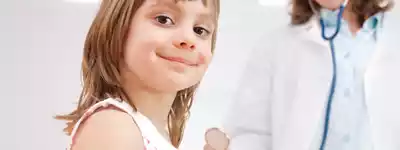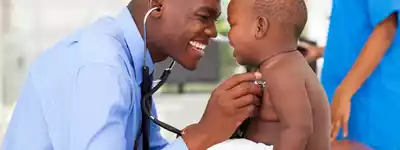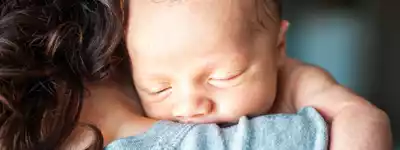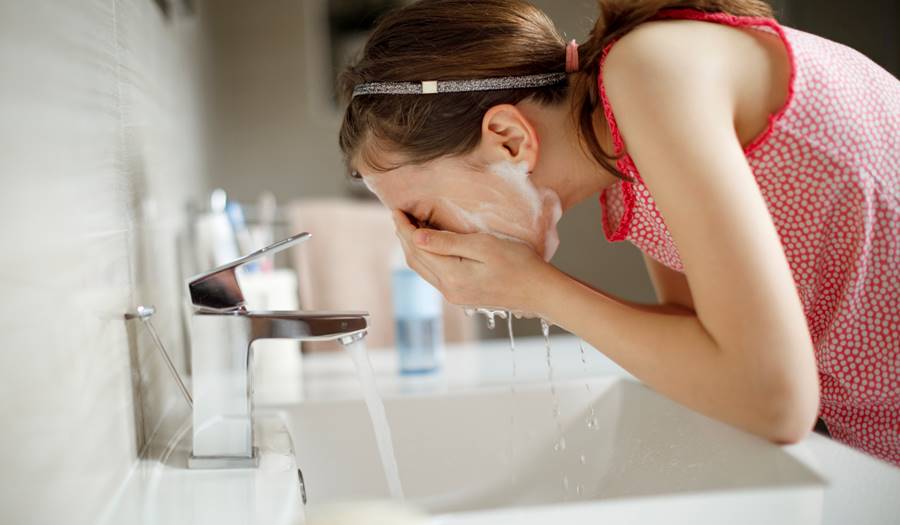
Acne and Skin Care
1/10/2022
During adolescence, the body is going through many changes, including changes to their skin. Acne is a common skin condition affecting teens. Acne is a skin condition that causes inflammation and infection in the hair follicles of the face, chest, and back. Over 85% of teens will experience acne at some point during adolescence and over 30% of adults have acne. What causes acne? How do you treat acne? What makes acne worse?
Acne
Acne occurs when the hair follicles are plugged with oil and dead skin cells. The combination of oil and skin cells block pores in the skin causing
- Whiteheads (closed plugged pores)
- Blackheads (open plugged pores)
- Papules (small, red, tender bumps)
- Pustules (aka pimples-papules with pus at the tips)
- Nodules (large, solid, painful lumps under the skin)
- Cystic lesions (painful, pus-filled lumps under the skin)
Pores become clogged and then become inflamed or infected resulting in pustules, nodules, and cystic lesions.
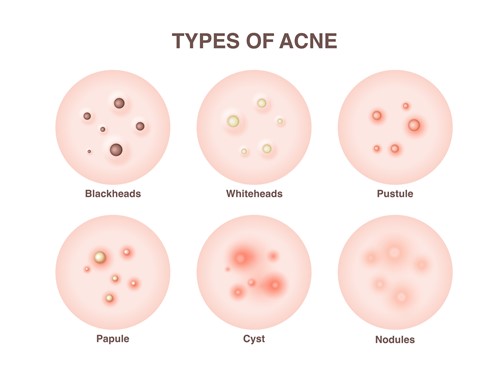
Causes
The four main causes behind acne are excessive oil production, clogging of hair follicles by dead skin, bacteria on the skin, and inflammation.
Risk factors for acne include
- Age (more common during teen years)
- Hormonal changes during puberty, menstruation, or pregnancy
- Family history
- Contact with greasy or oily substances
- Friction or pressure on skin by phones, helmets, sports equipment, backpacks, tight collars
Acne is not caused by
- Poor hygiene or improper cleansing
- Most makeup
- Chocolate
- Greasy foods
- Not scrubbing hard enough
Acne can worsen due to
- Washing too often with a harsh soap
- Some makeup or hair products that clog pores or contain heavy oils
- Sports gear
- Hormones
- Stress
- Popping or picking at acne lesions
Acne Treament
If your child has persistent acne, over the counter or prescription based medications may be necessary to improve their skin and eliminate papules, pustules, nodules or cysts. Improving acne is important to prevent scarring and improve self-esteem in teens.
Treatment with medication is based on the severity of the acne and moves in a step-based process. Links to over the counter treatments can be found HERE. Any treatment plan will take a minimum of 6-8 weeks to start to see and effect and up to 12 weeks for full effect. Consistency is key. With any treatment plan it is important to follow directions and not overdo it. More is not always better.
Skin Care
All acne treatment involves a good skin routine. A good skin routine includes
- Washing twice daily with a mild soap
- Do not wash more than twice daily or with a harsh soap. This can disrupt the skin barrier, increase water loss, increase bacterial load, and promote comedones.
- Do not scrub
- Using a benzoyl peroxide or salicylic based wash is ok
- Apply a gentle toner, if desired
- Apply any topical treatments over entire face, not just on pimples
- Using a light non-comedogenic moisturizer
- Using oil free, non-comedogenic makeup
Acne Medications
Benzoyl Peroxide
Benzoyl peroxide comes as a wash, lotion or gel that kills bacteria, unplugs oil ducts, and helps heal pimples. It comes in concentrations from 2.25% to 10%. To use, either wash your face with the wash daily or apply the lotion or gel to the whole face avoiding the eye area.
The gels and lotions can be drying so start once daily and increase to twice daily as tolerated. If your skin is dry or sensitive, start at a lower strength and increase as tolerated. These products can also bleach clothing or fabrics so take care when applying and consider using a designated pillowcase at night.
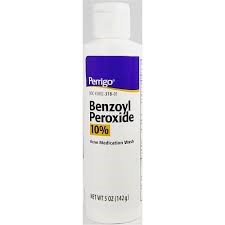
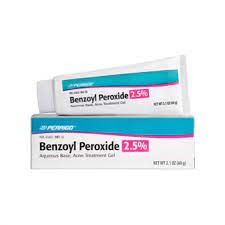
Topical Retinoids
Topical retinoids include products such as tretinoin (Retin-A) or adapalene (Differin). These are creams or gels that unplug oil ducts and are anti-inflammatory. To use, apply a pea size amount to whole face avoiding eye area.
Because topical retinoids can be drying, start treatment by applying only twice a week and increase up to daily as tolerated. They topical treatments can also cause sun sensitivity.
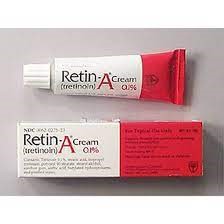
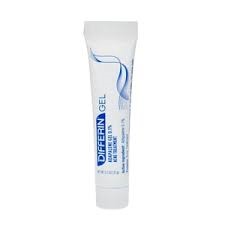
Antibiotics
Antibiotics reduce colonization of skin and hair follicles and decrease inflammation. Topical antibiotics may be applied as cream, lotions, solutions, gels. They should be applied as directed to the whole face. Topical antibiotics should always be used in conjunction with a benzoyl peroxide product.
Oral antibiotics are used for moderate and severe acne in children over the age of 12. The oral medication most commonly used are minocycline and doxycycline. Doxycycline can cause sun sensitivity which can be severe in some people. It requires frequent or daily sunscreen application, even in winter, and sun avoidance. Doxycycline can also cause esophagitis. To avoid this, take the medication with a full glass of water and remain upright for an hour after taking the medication.
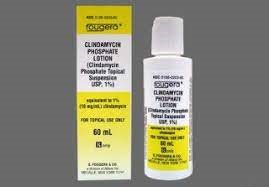
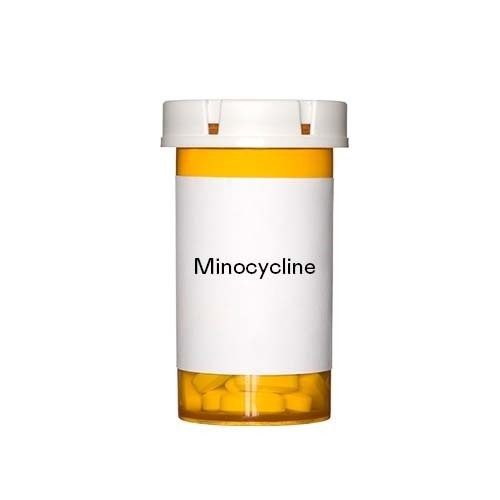
Accutane
Accutane, or isotretinoin, is a strong oral medication used for moderate severe or severe acne. Accutane is prescribed by a dermatologist who has received a certification to order this medication. This medication is a daily oral medication that should be taken with a meal containing fats.
If your dermatologist starts you on this medication, you will be seen monthly for an evaluation and monitoring. Your dermatologist will be monitoring your skin as well as laboratory studies during your course of treatment. Your cholesterol and liver function will be monitored as the medication can increase triglyceride and liver enzymes. You may also be required to take a a monthly pregnancy test. This medication cannot be taken during pregnancy due to the high risk of birth defects. You will also be required to complete an IPledge form certifying that you are not pregnant every month and your plan to prevent pregnancy. Your dermatologist must complete their part of the iPledge contract or you cannot receive your monthly refill.
Accutane can cause severe dryness, especially of lips and eyes, as well as body aches, and nose bleeds. Using hydrating washes, lotions, lip therapies, eye drops can improve the dryness. These effects go away once the medication is stopped. Most patients are on the medication for 4-6 months.
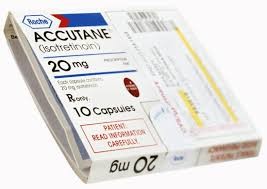
Hormone Therapy
Hormone therapy is used to suppress and block the effects of androgens as well as reduce oil. Hormonal therapy includes combination oral contraceptive pills and spironolactone. Hormone therapy is usually reserved for moderate severe to severe acne.
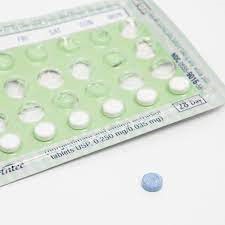
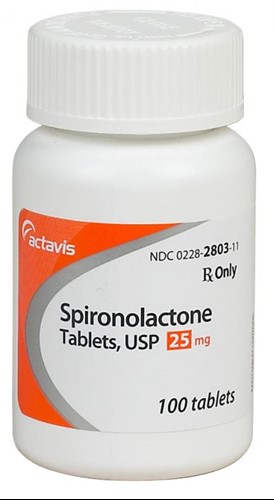
Types of Acne
Mild Acne
Acne is considered mild if you have less than 20 whiteheads or blackheads and fewer than 15 papules or pustules. Mild acne is usually only found on the face.
Mild acne is treated with topical therapies. Single topical therapy can be applying or using a benzoyl peroxide product or topical retinoid. Topical antibiotics should never be used without a benzoyl peroxide product.
Combination therapy may be used if skin is not responding to a single product.
Combination therapy can include
- Benzoyl peroxide and a topical antibiotic
- Benzoyl peroxide and a topical retinoid
- Benzoyl peroxide, topical retinoid, and topical antibiotic/

Moderate Acne
Acne is considered moderate if you have 20 to 100 whiteheads or blackhead and/or 15 to 50 papules or pustules. Moderate acne is normally on the face but may be affect the trunk.
Moderate acne can be treated with combination topical therapies including
- Benzoyl peroxide and topical retinoid
- Benzoyl peroxide, topical retinoid, and topical antibiotic
Moderate acne that is unresponsive to the above or is more severe may be treated with an oral antibiotic plus combination topical treatment including benzoyl peroxide and a topical retinoid.
Females with moderate acne should consider adding in hormonal therapy if their acne is not responsive to topical treatment and oral antibiotics.
Moderate Severe
Acne that is moderate severe has 40-100 whiteheads or blackheads, 40-100 inflamed papules or pustules, and up to 5 deeper nodules or cystic lesions. The acne usually affects the face, trunk, and back.
Moderate Severe acne is treated with an oral antibiotic plus combination topical treatment including benzoyl peroxide and a topical retinoid. Accutane should also be considered at this point.
Females with moderate severe acne should consider adding in hormonal therapy if their acne is not responsive to topical treatment and oral antibiotics.
Severe Acne
Acne is considered severe if there are more than 100 whiteheads or black heads, more than 50 inflamed bumps, or more than 5 deep nodules or cystic lesions. Severe acne is found on the face, chest, and back. Severe acne involves extensive inflammation and can result in diffuse scarring. Only 5% of people with acne have severe cystic acne.
Treatment of severe acne includes oral antibiotics with benzoyl peroxide, topical retinoid, and topical antibiotic treatment. Often this type of acne requires Accutane treatment to improve. Females should also consider hormonal therapy if they have severe acne.

Myths
There are many myths surrounding acne and acne treatment. People believe tanning either in the sun or in a tanning bed can improve acne. This is not true, and if on certain medications for acne, can result in skin damage. Toothpaste also does not make pimples go away and often the fluoride in toothpaste makes acne worse. Also scrubbing acne or popping pimples can make pimples get bigger and take longer to improve. And lastly, washing your face many times during a day can make acne worse by increase water loss, increasing bacteria, and disrupting the skin barrier.
Acne is not only a skin condition but can also affect a teen’s self-confidence and image. Treatments are available. If your child or you are concerned about their skin or looking for acne treatment, please discuss with your provider.
Children’s Health Care of Newburyport, Massachusetts and Haverhill, Massachusetts is a pediatric healthcare practice providing care for families across the North Shore, Merrimack Valley, southern New Hampshire, and the Seacoast regions. The Children’s Health Care team includes pediatricians and pediatric nurse practitioners who provide comprehensive pediatric health care for children, including newborns, toddlers, school aged children, adolescents, and young adults. Our child-centered and family-focused approach covers preventative and urgent care, immunizations, and specialist referrals. Our services include an on-site pediatric nutritionist, special needs care coordinator, and social workers. We also have walk-in appointments available at all of our locations for acute sick visits. Please visit chcmass.com where you will find information about our pediatric doctors, nurse practitioners, as well as our hours and services.
Disclaimer: this health information is for educational purposes only. You, the reader, assume full responsibility for how you choose to use it.

